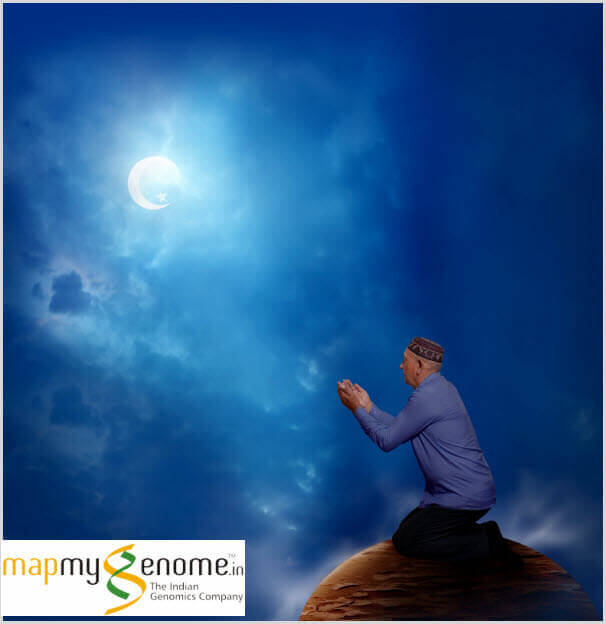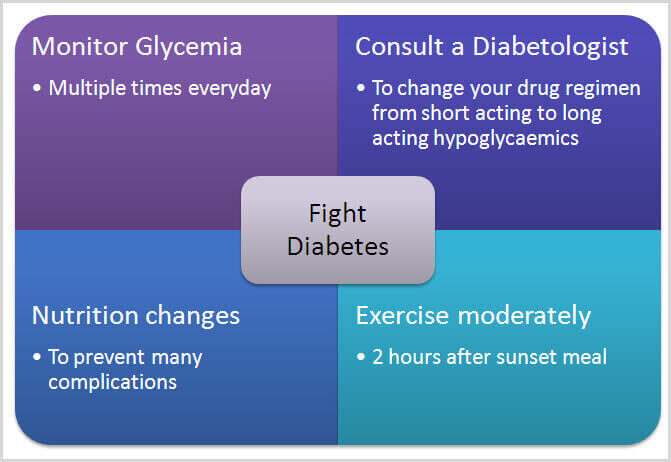Dietary Management of Diabetes: Holistic Approach During Ramzan
Jul 01, 2015
4232 Views
Muslims constitute the world’s second largest religious group according to a 2010 study (1, 2), contributing to 23% (i.e., 1.57 billion) of the world’s population, of which India has 177,286,000 or 14.6% of the total population. According to an EPIDIAR study in 2001, among 12,243 people with diabetes in 13 major Islamic countries, 43% of patients with type I diabetes and 79% of patients with type II diabetes fast during Ramzan, which leads to the estimate that worldwide more than 50 million people with diabetes fast during Ramzan (3).

During this period, there is a major change in - dietary patterns, abstinence from eating, drinking, smoking, and omission of drugs from dawn to dusk. These changes often result in excessive eating after sunset and insufficient sleep, leading to several health problems. Challenges encountered during Ramzan fasting in type I and II diabetic patients include increased hypoglycemia due to decreased food intake, hyperglycemia resulting from excessive eating at dawn and dusk, diabetic ketoacidosis, reduced dosage of medications, and dehydration due to absence of fluid intake. The practice of ingesting larger amounts of food (rich in proteins and fats) than normal contributes in a major way to the development of obesity. Interaction of these variables involved in the intermittent fast has led to exacerbation of health problems (4).
A recent EPIDIAR study showed there is 4.7-fold and 7.5-fold increase in the risk of severe hypoglycemia with type I and type II diabetic patients. There is a 5-fold and 3-fold increase in the incidence of severe hyperglycemia in type II and type 1 diabetic patients fasting during the month of Ramzan (3).
Fasting by patients with diabetes represents an important personal decision that should be made in light of guidelines for religious exemption and after careful consideration of associated risks. Nutritional advice should be personalized to the needs of the diabetic patients or those with medical problems keeping in mind the aim of maintaining a constant basal metabolic rate.

Recommended changes to nutrition during Ramzan
- Have 2 to 3 meals, ensuring adequate fluid intake
- Avoid / limit the amount of high-calorie (sweets), highly refined, and deep fried foods
- After sunset consume starchy foods (rice, roti, oats), a good portion size of vegetables, and moderate portions of protein and fats
- Consume fruits after a gap of 2-3 hours following dinner
- Include slow digesting foods with complex carbohydrates and high fibre at pre-dawn prior to fasting as this results in balanced blood glucose levels during fasting periods
Zindagi Mubarak, with Mapmygenome!
Worried about diabetes? We can help you
Genetic Counsellors at Mapmygenome can help you understand patterns of diabetes based on your health history. Our tests Genomepatri™, Cardiomap™, and Sugar Gene™ can help you understand your genetic risk for diabetes and related complications. Following the tests, our Genetic Counsellors will correlate these findings with your health history and give a comprehensive set of action plans for a healthy life.
To learn more, write to info@mapmygenome.in or call 1800-102-4595. Today!
About the author
Dr. Lakshmi Addala is a Senior Genetic Counsellor and Nutrition Expert at Mapmygenome. She is a firm believer in healthy living through the right diet.
For a health history consultation with Dr. Lakshmi, write to info@mapmygenome.in or call 1800-102-4595. Today!
Works cited
- The Canadian Society of Muslims: Muslim population statistics [article online], 2000. Available from http://muslimcanada.Org/muslimstats.html. Accessed 14 April 2005.
- An analysis of the world Muslim population by country/region [article online]. Available at http://www.factbook.net/muslim_pop.php. Accessed 14 April 2005.
- Salti I, Bénard E, Detournay B, Bianchi-Biscay M, Le Brigand C, Voinet C,Jabbar A : EPIDIAR study group. A population-based study of diabetes and its characteristics during the fasting month of Ramadan in 13 countries: results of the epidemiology of diabetes and Ramadan 1422/2001 (EPIDIAR) study. Diabetes Care 2004; 27:2306–2311.
- International Meeting on Diabetes and Ramadan Recommendations: Edition of the Hassan II Foundation for Scientific and Medical Research on Ramadan. Casablanca, Morocco, FRSMR, 1995.
